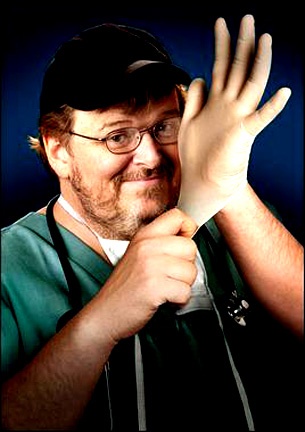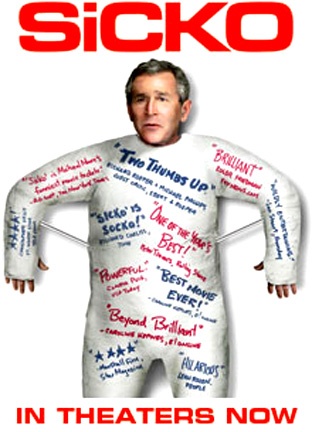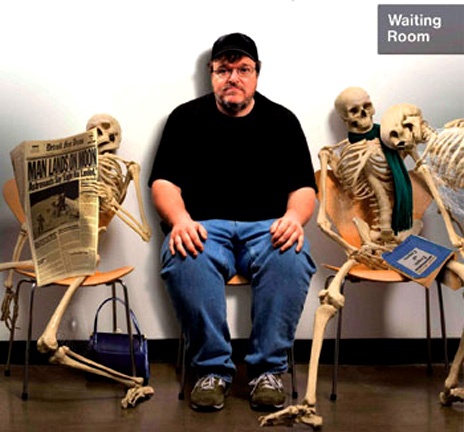Sicko Examines Health Care with Rubber Gloves
Does a Michael Moore Film Again Preach to the Coverted
By: Nikolas Foster - Jul 06, 2007
Michael Moore's latest documentary "Sicko" deals with the American healthcare system and its shortcomings. He is not focusing on the estimated 42 million uninsured Americans. Rather, he documents those that are insured and faithfully pay their premiums each month. Moore compares horror stories from insiders like former HMO employees and average patients dealing with a system that never works in their favor, Moore paints a sinister picture of a health care system, that doesn't appear to deserve this name in the first place.
In Moore's tradition, he confronts the viewer with tear jerking accounts of people losing their kids and loved ones while their insurances refused to pay for cancer treatments, antibiotics, or simply denied payments for non pre-approved hospitals. He contrasts this with patients from Canada, the United Kingdom and France, where a free universal health care works for people and not against them. Moore brings it home when he tells the stories of ground zero volunteer firefighters and emergency medical workers who have been forced to sell their belongings and hold fundraisers to pay for unaffordable health care. In a final affront, Moore tries to take a group of these patients to Guantanamo Bay, Cuba, where the alleged terrorist inmates enjoy free universal healthcare.
As I grew up in Germany, a country with comprehensive healthcare, this movie alerted me to subconscious efforts to block out thoughts of getting sick since coming to the United States. It reminded me of friends who don't want to lose jobs for the fear of losing benefits. Sadly, worrying about falling through the cracks of healthcare- something foreign to people from Great Britain, France and Germany- is what we are used to, unless blessed by a healthy wallet.
At the core of Moore's movie, though, lies a question that is more existential: What kind of country do we live in and how do we want this country to be? Moore answers this question by alluding to the archetypical American neighbor that helps, whenever there is need. But are we as Americans ready and willing to expand our neighborhood to all of the US? Will a farmer in Idaho be willing to pay for the knee surgery of a kid from New York? Are we a people that accepts the capability of government to organize a comprehensive nationwide healthcare financed by taxes? I don't think so. And the answer to this lies precisely in the cornfields of Idaho.
Living in Massachusetts, which coincidentally has just pushed through with a (not free) universal healthcare law, we sometimes forget about the rest of the country. Who did not leave Moore's last movie Fahrenheit 9/11 with the certainty that the Bush administration would lose the 2004 elections by a landslide? As we did then, we leave Sicko thinking that change is imminent. But just as with Fahrenheit, where we were proven wrong by Ohio, Idaho and the other Red States, I predict Sicko will fail to be the rallying cry that unites the country to change the system. This is not Moore's fault.
People living amongst cornfields most likely won't watch a Moore movie. And let's not forget that this country was founded by a group of rich capitalists whose utopia was characterized not by solidarity, but economic liberties. This promise of economic fulfillment is also the root of that quintessentially American, frontier crossing individualism, which in turn breeds contempt of "Big Government." So while Moore preaches "the system is broken," he might want to remember that this individualism, one of the pillars of our cultural identity, will not let us delve into nationwide altruism, be it in the field of healthcare or maybe at some point social security.
The poor and empathetic persons' hope lies in the new system of -in the words of Ronald Reagan- "communist" Massachusetts. Until then, I am glad to live here and- just in case- hold on to my German residency.




